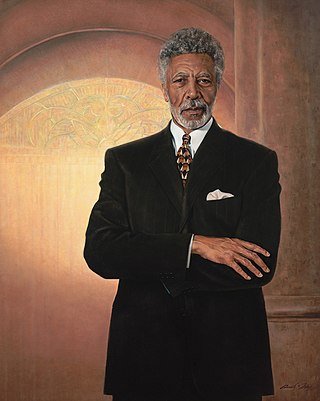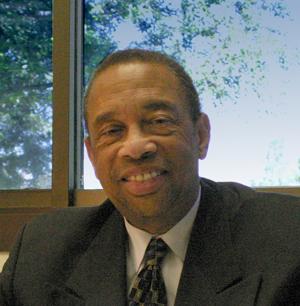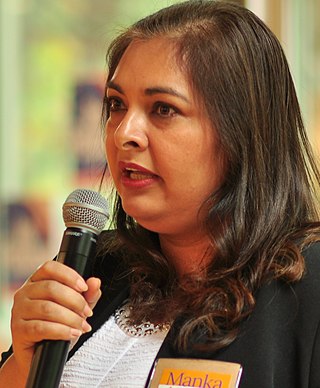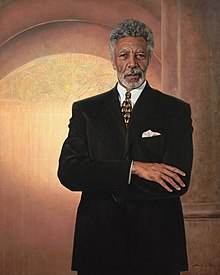
Ronald Vernie Dellums was an American politician who served as Mayor of Oakland from 2007 to 2011. He had previously served thirteen terms as a Member of the U.S. House of Representatives from California's 9th congressional district, in office from 1971 to 1998, after which he worked as a lobbyist in Washington, D.C.

Don Richard Perata is a California lobbyist and former Democratic politician, who was President pro tempore of the California State Senate from 2004 to 2008. He came in second place in the November 2010 election for Mayor of Oakland.

Elihu Mason Harris is a retired American politician and college administrator. A member of the Democratic Party, Harris served as the 46th Mayor of Oakland, California from 1991 to 1999; he previously served for 12 years (1978–1990) as a member of the California State Assembly. He was the Chancellor of Peralta Community College District from 2004 to 2010.
Audie Elizabeth Bock is an American film scholar and politician who served in the California State Assembly from 1999 to 2000, and was elected to the Sarasota County, Florida Soil and Water Conservation District in 2018.

Elections in California are held to fill various local, state and federal seats. In California, regular elections are held every even year ; however, some seats have terms of office that are longer than two years, so not every seat is on the ballot in every election. Special elections may be held to fill vacancies at other points in time. Recall elections can also be held. Additionally, statewide initiatives, legislative referrals and referendums may be on the ballot.

California's 37th congressional district special election, 2007 was held on August 21, 2007 to replace the seat of Congresswoman Juanita Millender-McDonald, who died of cancer on April 22, 2007. California State Assemblymember Laura Richardson received the plurality of votes in an open primary election on June 26. Since no candidate won a majority of votes in that contest, the special election was held on August 21, in which Richardson was the winner.
Wilma Chan was an American politician in California serving on the Alameda County Board of Supervisors. A Democrat, she served in the California State Assembly from 2000 to 2006 before being termed out, representing the 16th District, which at the time included Oakland, Alameda, and Piedmont. She served as Assembly Majority Whip from 2001 to 2002 and from 2002 to 2004 as Assembly Majority Leader, the first woman and the first Asian American to hold the position. In 2008, Chan lost a Democratic Party primary election for the California State Senate District 9 seat.

Elections were held in Illinois on Tuesday, November 2, 2010. Primary elections were held on February 2, 2010.

The 2014 United States elections were held on Tuesday, November 4, 2014, in the middle of Democratic President Barack Obama's second term. Republicans retained control of the House of Representatives and won control of the Senate.

The 2018 United States Senate elections were held on November 6, 2018. Among the 100 seats, the 33 of Class 1 were contested in regular elections while two others were contested in special elections due to Senate vacancies in Minnesota and Mississippi. The winners were elected to six-year terms running from January 3, 2019, to January 3, 2025. Senate Democrats had 26 seats up for election, while Senate Republicans had nine seats up for election.

The 2018 United States elections were held on Tuesday, November 6, 2018. These midterm elections occurred during Republican Donald Trump's term. Although the Republican Party increased its majority in the Senate, unified Republican control of Congress and the White House was brought to an end when the Democratic Party won control of the House of Representatives in what was widely characterized as a "blue wave" election. However, both Donald Trump and House Minority Leader Nancy Pelosi claimed victory after the results of the midterm elections.

The 2022 United States Senate elections were held on November 8, 2022, concurrently with the midterm elections at the federal, state and local level, including the 2022 U.S. House of Representatives elections. Regularly scheduled elections were held for 34 of the 100 seats in the U.S. Senate, the winners of which will serve six-year terms in the U.S. Congress from January 3, 2023, to January 3, 2029, starting with the 118th United States Congress. One special election was also held to complete an unexpired term ending January 3, 2027. While pundits considered the Republican Party a slight favorite to gain control of the Senate, the Democratic Party outperformed expectations and expanded the majority they had held since 2021.

A special election was held on November 7, 2017, to fill the vacant seat in the Washington State Senate representing the 45th district. The seat was left vacant after the death of incumbent Andy Hill in October 2016. Dino Rossi, a former candidate for U.S. Senate in 2010 and for governor in 2004 and 2008, was appointed to fill the seat until the election. He announced that he would not run for the seat. The election was then contested between Manka Dhingra of the Democratic Party and Jinyoung Lee Englund of the Republican Party, who advanced as the top two finishers in the August primary. Dhingra won the election by more than ten percent, giving the Democratic caucus a 25–24 majority for the 2018 session.

The 2020 United States Senate special election in Arizona was held on November 3, 2020, following the death in office of incumbent Republican U.S. Senator John McCain on August 25, 2018. Governor Doug Ducey was required by Arizona law to appoint a Republican to fill the vacant seat until a special election winner could be sworn in. On September 5, 2018, Ducey appointed former U.S. Senator Jon Kyl to fill McCain's seat. However, Kyl announced he would resign on December 31, 2018.

The 2024 United States Senate election in California will be held on November 5, 2024, to elect a member of the United States Senate to represent the state of California. California uses a nonpartisan blanket primary, in which all candidates regardless of party affiliation appear on the same primary ballot and the two highest-placing candidates advance to the general election. Primary elections will take place on March 5, 2024.

The 2020 United States presidential election in Illinois was held on Tuesday, November 3, 2020, as part of the 2020 United States presidential election in which all 50 states plus the District of Columbia participated. Illinois voters chose electors to represent them in the Electoral College via a popular vote, pitting the Republican Party's nominee, incumbent President Donald Trump of Florida, and his running mate, Vice President Mike Pence of Indiana, against Democratic Party nominee, former Vice President Joe Biden of Delaware, and his running mate, Senator Kamala Harris of California. Illinois had 20 votes in the Electoral College. Prior to the 2020 election, all news organizations predicted Illinois was a state that Biden would win, or otherwise considered a safe blue state.

Kentucky state elections in 2018 were held on Tuesday, November 6, 2018, with the primary elections being held on May 22, 2018. These midterm elections occurred during the presidency of Republican Donald Trump and the governorship of Republican Matt Bevin, alongside other elections in the United States. All six of Kentucky's seats in the United States House of Representatives, nineteen of the 38 seats in the Kentucky State Senate, all 100 seats in the Kentucky House of Representatives, and one of the seven seats on the Kentucky Supreme Court were contested. Numerous county and local elections were also contested within the state.

The 2010 Oakland mayoral election was held on November 2, 2010 to elect the mayor of Oakland, California, electing Jean Quan to be their mayor. In early August 2010, incumbent mayor Ron Dellums announced that he would not be seeking reelection to a second term. In November 2010, Oakland also instant-runoff voting to elect its mayor, three city council races and four other local offices, with the elections for the mayor and Oakland council district four requiring multiple rounds of counting. Oakland used instant-runoff voting in the city's remaining elected offices in 2012. IRV was again used in 2014 and 2016, including in the 2014 mayoral election in which incumbent Jean Quan was defeated by Libby Schaaf.

The 1994 Oakland mayoral election was held on June 7, 1994 and November 8, 1994 to elect the mayor of Oakland, California. It saw the reelection of Elihu Harris.

The 2024 United States House of Representatives elections in California will be held on November 5, 2024, to elect the 52 U.S. representatives from the State of California, one from all 52 of the state's congressional districts. The elections will coincide with the 2024 U.S. presidential election, as well as other elections to the House of Representatives, elections to the United States Senate, and various state and local elections.















